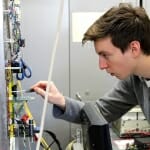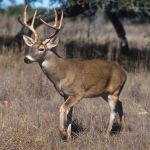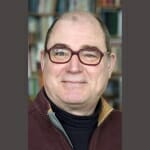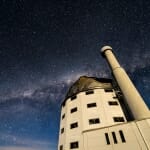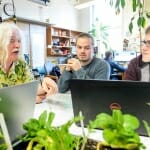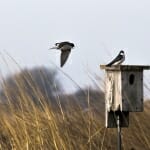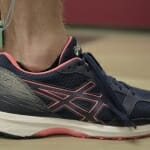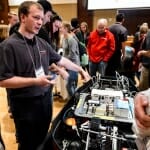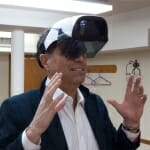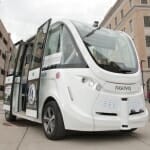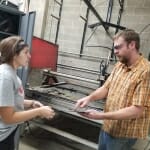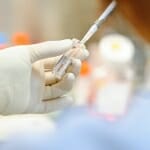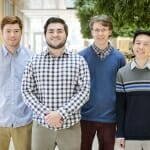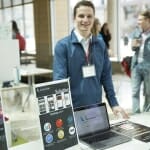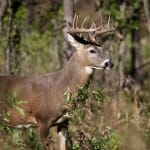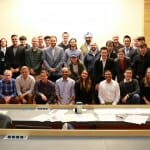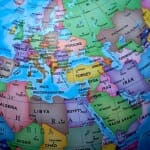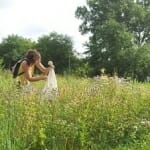Category Science & Technology
Prototype camera set for integration into novel gamma-ray telescope
A unique high-speed camera, designed to capture the fleeting effects of gamma rays crashing into the Earth’s atmosphere, will soon be on its way from the University of Wisconsin–Madison to Arizona’s Mount Hopkins. Read More
CWD prions discovered in soil near Wisconsin mineral licks for the first time
New research out of the UW–Madison has, for the first time, detected prions responsible for chronic wasting disease (CWD) in samples taken from sites where deer congregate. Read More
‘Origins’ scientists to take your questions Thursday during Reddit AMA
Ever wondered what it’s like to unearth a long-buried human ancestor? Or to peer into the night sky to discover the mysteries of galaxy evolution? Find out Thursday. Read More
Bird observing course an experience in finding passion for nature
In the Birds of Southern Wisconsin course, students must sometimes brave the elements to collect observations of Wisconsin’s overwintering and migratory birds. Read More
In ‘Origins,’ UW–Madison and South African scientists tackle mysteries of our shared beginnings
The quest to understand our beginnings — of our universe, of life on Earth, of our species — inspires people all over the world. At UW–Madison, researchers have forged partnerships with colleagues in South Africa and are uncovering answers and opening new scientific frontiers. Read More
Newest Badgerloop Pod unveiled
The UW–Madison Badgerloop team Thursday revealed Badgerloop Pod III — its latest entry into the 2018 SpaceX Hyperloop Competition, an event designed to spur new ideas about an ultrafast, futuristic form of transportation. Read More
Curious Madisonian still innovating, designing, improving 35 years after UW–Madison graduation
Bruce Winkler has invented, designed or facilitated an amazing range of devices since he earned his bachelor’s degree in mechanical engineering from UW–Madison in 1983. Read More
Driverless shuttle to deliver rides at UW–Madison April 24–25
Members of the public can ride in an Autonom Shuttle from 9 a.m. to 3 p.m. both days. The College of Engineering is home to the Wisconsin Automated Vehicle Proving Grounds. Read More
Women’s Shop Night a hit in Biological Systems Engineering
The Biological Systems Engineering department created a bi-weekly Women’s Shop Night to encourage more women to get hands-on experience in design and fabrication, and it's been a big success. Read More
Stem cell symposium to highlight clinical trials, safety and regulation
Speakers at the annual Wisconsin Stem Cell Symposium will discuss clinical trials involving stem cells, safety considerations and the regulatory environment under which ongoing stem cell work takes place. Read More
Two UW–Madison students named Goldwater Scholars; two receive honorable mentions
The Goldwater Scholarship is considered the most prestigious undergraduate scholarship in the natural sciences, mathematics and engineering in America. Read More
Line-skipping business takes top honors at UW–Madison innovation competition
Selected from among 35 student teams and student-led start-up companies, LineLeap received the $15,000 Qualcomm grand prize in the 2018 Transcend Madison Innovation Competition. Read More
Four computer-science business ideas win, and one already has customers
Competitions that encourage entrepreneurship are fundamental to economic and social progress in Wisconsin, the contest organizer says. Read More
How talking more can make you better at listening — to foreign languages
The typical foreign language class spends much of its time listening to fluent speakers, but new UW research shows that the students should spend more time talking. Read More
Snowfall patterns may provide clues to Greenland Ice Sheet
A new UW–Madison study describes a unique method to measure snowfall on the Greenland Ice Sheet that could help answer some key questions. Read More
Grad student researches native bee habitats in urban areas
In surveying Madison’s native bee populations, Vera Pfeiffer hopes to provide a better, more informed context for policies that can make the habitats we share with pollinators more biodiverse. Read More

